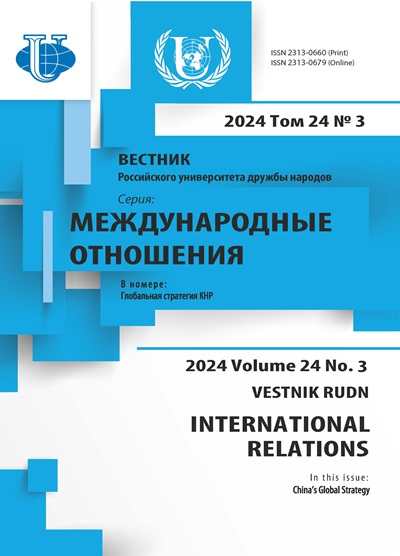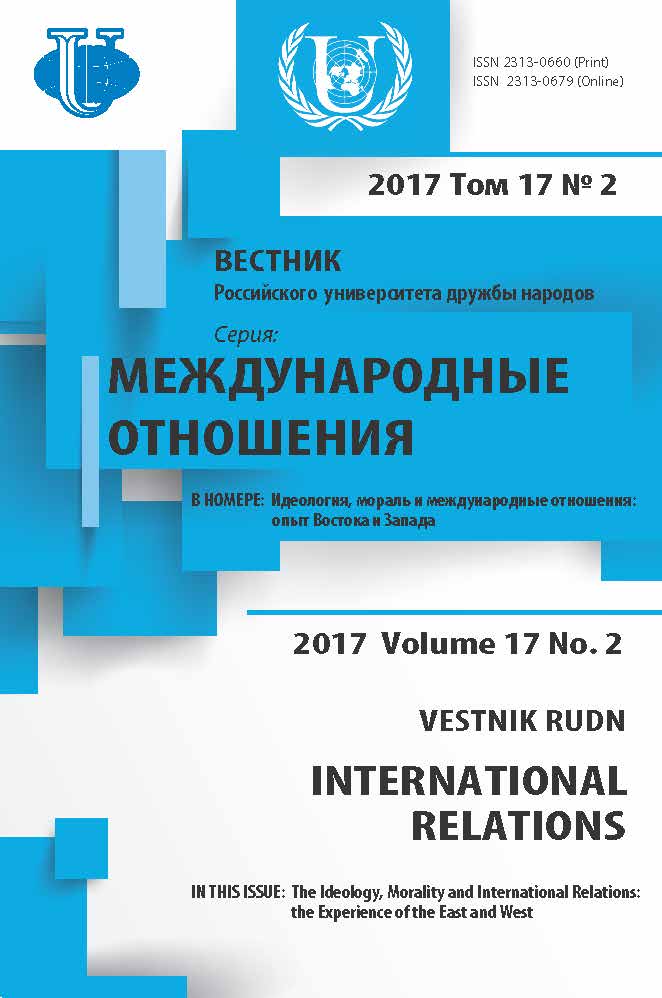Buddhism as a resource of “soft power” of China
- Authors: Ponka T.I.1, Dzhanaeva A.E.1, Zhao Jielin -1
-
Affiliations:
- Peoples' Friendship University of Russia (RUDN University)
- Issue: Vol 17, No 2 (2017): The Ideology, morality and international relations: the experience of the East and West
- Pages: 290-300
- Section: THEMATIC DOSSIER
- URL: https://journals.rudn.ru/international-relations/article/view/16064
- DOI: https://doi.org/10.22363/2313-0660-2017-17-2-290-300
Cite item
Full Text
Abstract
Now the concept of “soft power” introduced by the American political scientist Joseph Nye Jr., is of particular interest in the theory of international relations. Among the Asian countries special attention paid to China, which currently has not only extensive economic and political resources, but also sources of non-power influence. In the article, the authors explore a concept as “Buddhist diplomacy” and its role in China's foreign policy activities. It also examined the historical formation of Buddhism and its development as a resource of “soft power” by way of the one of state Chinese religions that is part of the syncretic complex, along with Confucianism and Taoism, in different periods of Chinese civilization, from the pre-imperial period to the modern framework. In this study were examined the views of Russian and foreign experts on the directions and spheres of the definition of the “Buddhism diplomacy” and the peculiarities of its implementation by the Chinese government. This research based on the using on using the historical approach and general scientific methods, such as analysis, synthesis, deduction, etc. In the article, the authors revealed the current state of religion on the example of Buddhism in China's foreign policy strategy both on the world stage and at the regional level and main aspects within which Chinese Buddhist diplomacy is developing.
Keywords
About the authors
Tatyana Ivanovna Ponka
Peoples' Friendship University of Russia (RUDN University)
Author for correspondence.
Email: ponka_ti@rudn.university
Moscow, Russia
Altn Erdnievna Dzhanaeva
Peoples' Friendship University of Russia (RUDN University)
Email: djanaeva.altn@ya.ru
Moscow, Russia
- Zhao Jielin
Peoples' Friendship University of Russia (RUDN University)
Email: zhaojielin@163.com
Moscow, Russia
References
- Gorbunova, S. A. (2008). Religion and Power. The history of Chinese Buddhism in the context of society and the state. Moscow: Forum. (In Russ.).
- Jangutov, L. E. (2016). The spiritual origins of the political strategy of China's soft power. Problemy Dal'nego Vostoka, 4, 159—167. (In Russ.).
- Ke, Yinbin. (2011). Fotszyao gotszi tszyaolyu yui gungun vaitszyao — Fan tsyuan'go chzhense chanvei, chzhungo fotszyao sekhuei fukhueichzhan Syuechen fashi. Gungun vaitszyao tszikan', (8), 78—84. (In Chinese).
- Kitinov, B. U. (2015). Buddhist culture: from the possibilities of soft power to the potential of Lumbini. Aziya i Afrika segodnya, (7), 53—57. (In Russ.).
- Kitinov, B. U. (2013). India, China and Russia: Civilizational Links over Political Processes. Himalayan and Central Asian Studies, 17 (3—4), 133—149.
- Kuan Yunjing (2011). Chzhungo dui dunnan'ya de fotszyao tszyaolyu. Gungun vaitszyao tszikan', (8), 21—27. (In Chinese).
- Kuznetsov, V. S. (2006a). Buddhism with a “communist” face. Aziya i Afrika segodnya, (4), 25—29. (In Russ.).
- Kuznetsov, V. S. (2006b). Buddhist factor in China's foreign policy. Moscow: Institut Dal'nego Vostoka RAN. (In Russ.).
- Li, Jin, Wang, Yun. (1997). Fusan ledao de “Den Syaopin syuan'fen” — 1978 nyan' Den Syaopin fanzhi tszishi. Danshi ven'yuan', 2, 17—20. (In Chinese).
- Malyavin, V. V. (2000.) Chinese civilization. Moscow: “Izdatel'stvo Aprel'”, OOO “Izdatel'stvo AST”, Izdatel'sko-prodyuserskii tsentr “Dizain. Informatsiya. Kartografiya”. (In Russ.).
- Methodical recommendations for writing final qualifying works of bachelors and master’s dissertations in the areas of training “International Relations” and “Regional Studies”. Ed. by D. A. Degterev, V. G. Zhangiryan, E. F. Chernenko. Мoscow: Publishing house of RUDN; 2015.
- Nye, J. Jr. (2004). Soft Power: The Means to Success in World Politics. New York: Public Affairs.
- Sen, T. (2014). Buddhism Across Asia: Networks of Material, Intellectual and Cultural Exchange. Singapore: ISEAS and Delhi: Manohar.
- Sen, T. (2012). The Spread of Buddhism to China: A Re-Examination of the Buddhist Interactions between Ancient India and China. China Report, 48 (11).
- Spiritual culture of China: encyclopedia: in 5 Vol. Ed. by M. L. Titarenko. Moscow: Vostochnaja literature. (In Russ.).
- Zhang, J. (2012). Buddhist Diplomacy: History and Status Quo. Los Angeles: Figueroa Press.











